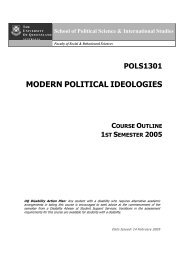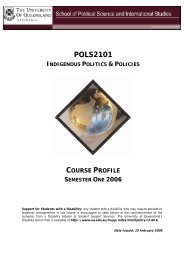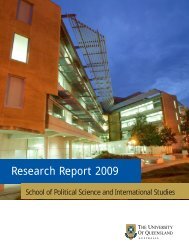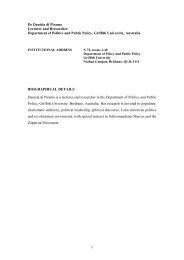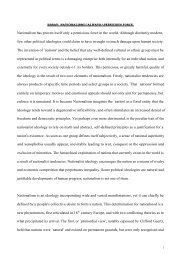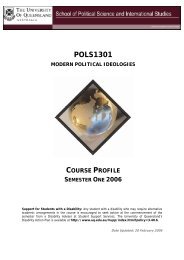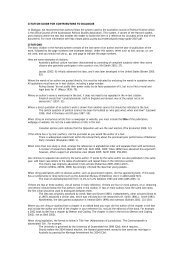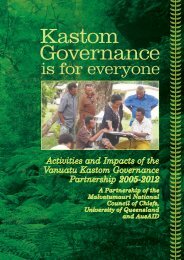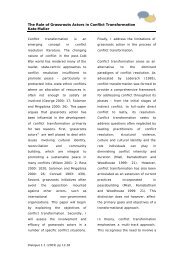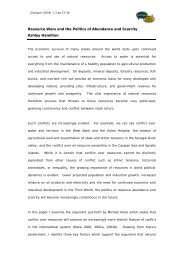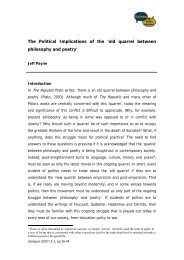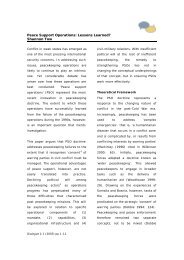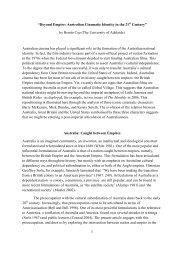Exploring the meaning of free speech with Katharine Gelber
Exploring the meaning of free speech with Katharine Gelber
Exploring the meaning of free speech with Katharine Gelber
You also want an ePaper? Increase the reach of your titles
YUMPU automatically turns print PDFs into web optimized ePapers that Google loves.
<strong>Exploring</strong> <strong>the</strong> <strong>meaning</strong> <strong>of</strong> <strong>free</strong> <strong>speech</strong> 46<br />
KG:<br />
In <strong>the</strong> book I cite some survey data that show that if you ask Australians, do you<br />
think you have <strong>free</strong> <strong>speech</strong>, a vast majority <strong>of</strong> <strong>the</strong>m will say yes. And if you ask<br />
<strong>the</strong>m, do you think we should have <strong>free</strong> <strong>speech</strong>, a vast majority <strong>of</strong> <strong>the</strong>m will say<br />
yes: <strong>the</strong>re is a wide spread assumption that <strong>free</strong> <strong>speech</strong> exists in Australia, that<br />
<strong>free</strong> <strong>speech</strong> is important and also that somehow it is part <strong>of</strong> <strong>the</strong> national fabric.<br />
When I say <strong>the</strong>y take it for granted what I mean is that, as I try to show in <strong>the</strong><br />
book, <strong>the</strong> evidence shows that that commitment to <strong>free</strong> <strong>speech</strong> is only skin deep<br />
and that when you push people on whe<strong>the</strong>r people who say things that are a bit<br />
uncomfortable or that are harmful or that make <strong>the</strong>m feel a bit uncomfortable -<br />
and if you press <strong>the</strong>m and say well should people be allowed to say this or should<br />
people be allowed to say that - <strong>the</strong>ir support for <strong>free</strong> <strong>speech</strong> crumbles very<br />
quickly.<br />
I don’t think that <strong>the</strong> Australian public very well understands that <strong>the</strong> true test <strong>of</strong><br />
whe<strong>the</strong>r we have <strong>free</strong> <strong>speech</strong> is what happens at <strong>the</strong> coal face on a day to day<br />
level: whe<strong>the</strong>r people allow somebody to say something even though it makes<br />
<strong>the</strong>m feel uncomfortable. In Australia, <strong>the</strong>re is a lot <strong>of</strong> evidence that people don’t<br />
want <strong>speech</strong> to be heard if <strong>the</strong>y feel that it is uncomfortable. That’s why I think<br />
<strong>the</strong>y take <strong>free</strong> <strong>speech</strong> for granted.<br />
JC:<br />
KG:<br />
You’ve mentioned a couple <strong>of</strong> times <strong>the</strong> notion that <strong>speech</strong> can be harmful. I<br />
remember that saying from childhood: sticks and stones will break my bones but<br />
words will never hurt me. We’re brought up <strong>with</strong> this notion that <strong>speech</strong> doesn’t<br />
harm. So how do you think <strong>speech</strong> might be harmful?<br />
I don’t agree at all <strong>with</strong> that childhood poem or rhyme, or whatever it is, because I<br />
think that is what people used to tell children in <strong>the</strong> past to help <strong>the</strong>m cope <strong>with</strong><br />
<strong>the</strong> hurt that <strong>the</strong>y were feeling. But in a way it’s dismissing <strong>the</strong> hurt that <strong>the</strong>y<br />
were really feeling and dismissing <strong>the</strong> harm that <strong>the</strong>y may have felt.<br />
I guess <strong>the</strong>re are two distinct ways in which <strong>speech</strong> can be harmful. But I don’t<br />
want to suggest that everyone who’s ever targeted by hate <strong>speech</strong> is immediately<br />
victimised and <strong>the</strong>refore marginalised, disempowered and silenced. In fact, some<br />
people are galvanised by being targeted by hate <strong>speech</strong>. They’re galvanised into<br />
response. They’re galvanised into solidarity <strong>with</strong> o<strong>the</strong>rs who’ve experienced <strong>the</strong><br />
same fate and <strong>the</strong>y’re galvanised to fight discrimination, <strong>the</strong> discrimination that<br />
hate <strong>speech</strong> represents. So I don’t want to suggest that everyone who’s ever<br />
targeted by harmful hate <strong>speech</strong> is somehow victimised and assumes that identity.<br />
But to go back to your question about how <strong>speech</strong> harms; harmful hate <strong>speech</strong><br />
might lead to fur<strong>the</strong>r acts <strong>of</strong> violence or discrimination. Hate <strong>speech</strong> is capable <strong>of</strong><br />
creating a climate <strong>with</strong>in which fur<strong>the</strong>r acts <strong>of</strong> violence are more liable to occur.<br />
We have plenty <strong>of</strong> examples <strong>of</strong> this. What happened in Germany in <strong>the</strong> 1930’s is<br />
a very clear example, but <strong>the</strong>re are o<strong>the</strong>rs. What happened in Rwanda much more<br />
recently for example. In Australia, arguably, <strong>the</strong> hate <strong>speech</strong> and misinformation<br />
that has been propagated around refugees has contributed to an environment



